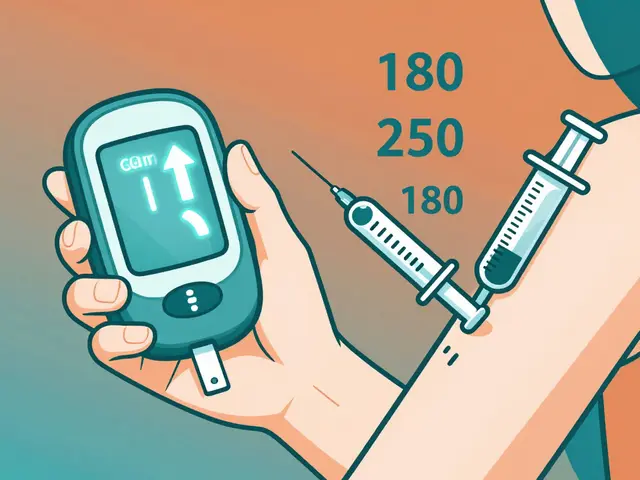
How Ezetimibe Works: Stopping Cholesterol at the Source
Ready for some real talk about cholesterol? Most folks know statins are the main players when it comes to lowering cholesterol, but ezetimibe brings something new to the table. Instead of slowing down cholesterol production in the liver like statins do, ezetimibe blocks cholesterol absorption in the gut. This single move can change the whole cholesterol game for certain people. Here’s how it breaks down: when you eat, your intestines pull cholesterol from food into your bloodstream. Ezetimibe sits right at the intestinal wall and tells cholesterol, “No entry.” It does this by blocking the Niemann-Pick C1-Like 1 (NPC1L1) protein, which is a main door for cholesterol to sneak in.
This targeted approach sets ezetimibe apart. Imagine statins and ezetimibe as two security guards at different doors—statins working the liver, ezetimibe patrolling the gut. Combined, they cover more ground. Pop quiz: how much cholesterol in your blood actually comes from your diet? Only about 25%. The rest? Your own body makes it. That’s why some people need more than just healthy eating to keep their numbers in check.
Here’s a quick fact: taking ezetimibe alone usually cuts LDL cholesterol—those are the "bad" guys—by about 18-25%. Not too shabby, but compare that to statins, which can go 30-50% or more. So why care? Well, some people just can’t tolerate statins. Side effects, muscle aches—sometimes the body just says "no thanks." For these folks, ezetimibe can be a solid solo pick. Others might need to pile on both drugs to get those stubborn cholesterol levels down. It’s also handy for people with familial hypercholesterolemia (that’s inherited high cholesterol), where just one type of med doesn’t always cut it.
That’s not all. Ezetimibe isn’t just working alone; it’s often combined with statins in one tablet to make life easier for patients. Little fun nugget: the only combo cholesterol pill to ever make it on the World Health Organization’s List of Essential Medicines is actually a statin plus ezetimibe.
What the Studies Show: Outcomes That Matter
Every drug promises the world, but what does the science say about ezetimibe? Let’s dig into the data. The real splash came from the IMPROVE-IT trial—a mega-study that ran for over six years and involved more than 18,000 people who’d just had a heart attack or major heart issue. These folks got simvastatin (a statin) either alone or combined with ezetimibe. What happened? The combo group had a 2% lower risk of heart attacks, strokes, or dying from heart problems compared to the statin-only group. It doesn’t sound huge, but in heart disease, that’s a big deal.
Why does this even matter? Some cholesterol drugs lower numbers on paper but don’t really prevent heart attacks or strokes where it counts. Ezetimibe proved it can move the needle in the real world—not just on a lab test.
To really see how ezetimibe stacks up to statins or works alongside them, check out this deep-dive: ezetimibe vs atorvastatin. You’ll get more side-by-side numbers, different combos, and where the results matter most for actual patients.
It isn’t just a statin fallback. The SHARP trial tossed ezetimibe into the spotlight for people with advanced kidney disease—not a usual statin crowd. They saw fewer major “atherosclerotic events” (think heart attack, stroke, surgery for clogged arteries) compared to placebo. That’s huge for a group that’s often tough to treat.
Another interesting point: the effects seem extra useful for people with high risk of heart events—like those with diabetes or already damaged arteries. The bigger the risk, the more you stand to gain from adding ezetimibe to your routine.
| Study | Participants | Outcome with Ezetimibe |
|---|---|---|
| IMPROVE-IT | 18,144 with heart disease | 2% absolute decrease in major events |
| SHARP | 9,438 with kidney disease | Significant drop in heart attacks/strokes |
Set side by side, the difference may look small, but remember—heart disease is so common that even minor improvements save lots of lives.

Who Gets Ezetimibe? Making Smart Choices
Not everyone should jump on ezetimibe right away. It’s not a “more is better” game. Doctors pick ezetimibe for specific reasons. Can’t handle statins? Ezetimibe is often first in line. If you tried a statin and broke out with severe muscle pain or just couldn’t get your cholesterol where the doctor wants it, that’s another reason to add (or switch to) ezetimibe.
Let’s talk about high-risk groups. People with genetic disorders like familial hypercholesterolemia—they start off with scary-high cholesterol even as kids—may need aggressive combo therapy. Same goes for diabetes patients. They've got a higher baseline risk of heart and vessel trouble, so getting LDL (“bad”) cholesterol low is mission-critical. In people who already have heart disease or who’ve had a heart attack, guidelines recommend pushing LDL below 70 mg/dL when possible. If a statin alone can’t deliver, ezetimibe is the next tool to grab.
There’s also an eye on patient tolerability. Muscle pain is the top side effect driving people away from statins. Ezetimibe is different—it rarely causes this issue and, in most folks, it’s as easy as taking a daily multivitamin when it comes to side effects. Mild belly discomfort or slightly raised liver tests can happen—worth knowing, but nothing like statin-induced myopathy.
- If statins aren’t enough: Add ezetimibe for more LDL reduction.
- If statins cause side effects you can’t stand: Ezetimibe alone is an option.
- If someone has stubbornly high cholesterol due to genes: Most clinicians reach for a statin-ezetimibe combo up front.
- If kidney issues complicate things: Ezetimibe plus a lower statin dose can work safely.
But what about cost? Ezetimibe is available as a generic, so it’s usually less pricey than newer cholesterol drugs (like PCSK9 inhibitors). That matters if you’re looking at therapy for the long haul.
Ezetimibe’s Role Today: Where Does It Fit?
Every year, new cholesterol drugs hit the market with splashy headlines and celebrity ads. Still, ezetimibe holds its spot because it’s proven, safe, and plays well with others. If you need cholesterol numbers catastrophically lower than what statins alone can offer, it’s the obvious sidekick—almost like Batman and Robin. Start with a statin, check where you land a few months later, and then add ezetimibe if the numbers aren’t quite there. The beauty is that you typically don’t stack up nasty side effects by layering these two. That’s part of why doctors love this combo—more impact without much extra risk.
Don't forget that for younger patients with extreme LDL elevations (say, over 190 mg/dL), or for anyone not budging on statin monotherapy, stepping in with ezetimibe makes sense. For older adults with concerns about statin side effects, especially muscle complaints, using low-dose statins plus ezetimibe offers a safer middle ground. And remember, for folks who just want a single pill, fixed-dose combinations now make that daily routine even easier.
If you’re shopping for alternatives or just weighing your options, that comparison piece—ezetimibe vs atorvastatin—lays out specific head-to-head data, simple side-by-side charts, and some surprises about where each drug shines.
Here's the deal: Ezetimibe doesn’t replace healthy habits. What you eat, whether you move your body, if you light up cigarettes—those all still matter. But for millions, ezetimibe is a quiet powerhouse that picks up where other drugs leave off. It's the kind of therapy that doesn’t get much hype, but quietly does its job, bumps up outcomes, and fits into more lives thanks to gentler side effects.
If you find yourself staring at the numbers on your next cholesterol test, remember that the best solution isn’t “one drug fits all.” Ezetimibe is a smart, safe option to have in your corner—especially when the battle against cholesterol needs more than one punch.
Adrian Hernandez
I've gotta say, this whole thing feels like another big pharma hustle to me. Statins always get pushed like they're the only magic fix. But ezetimibe? Sounds like just a sidekick that only gets mentioned when statins alone don’t sell enough pills.
With all these studies, do we even get the full truth about long-term risks? Doctors can't be that blind, or are they just stuck in old-school prescribing habits? So many questions and not enough real answers.
Honestly, it feels like the medical establishment is just recycling the same old info to keep us hooked on meds. Feels exhausting trying to figure out what's best without getting bombarded by conflicting data.
Why can't they just give us clear guidance? Instead, it’s like they keep us in the dark unless we dig really deep ourselves.
Chris Meredith
I appreciate this post breaking down the mechanisms of ezetimibe versus statins. It's refreshing to see a nuanced explanation without just dumping out jargon.
Ezetimibe's inhibition of intestinal cholesterol absorption really complements statins’ role in reducing hepatic cholesterol synthesis, making combination therapy quite effective for certain patient profiles. This dual mechanism highlights tailored lipid-lowering strategies supported by pivotal clinical endpoints.
Also, outcome studies are paramount here, as they establish concrete cardiovascular risk benefits rather than just changes in LDL-C values. It's crucial for us to understand which patients truly gain from adding ezetimibe or switching therapies.
I'd love to see more real-world data reflecting adherence and safety outcome trends alongside efficacy. Overall, this article nudges us toward smarter, evidence-based patient choices.
Mina Berens
Omg, I found the way this post explained ezetimibe compared to statins super insightful! I was always curious cuz everyone just talks about statins like they’re the only option.
The part about how ezetimibe blocks cholesterol absorption rather than production made so much sense to me! It’s kinda cool how they work together sometimes.
Also, I love that the post mentions how outcome studies really matter—like, not just numbers but whether the meds actually help people live healthier.
Kinda wish my doctor had gone into this much detail instead of just saying “take statins.” Would’ve made me feel a lot more informed and confident about my treatment.
Thanks for sharing—totally learned a lot! 😊
duncan hines
This entire debate is blown way outta proportion. You got the statins fanboys and the ezetimibe cultists squabbling about who’s better when honestly, neither is some miracle cure. And yeah, typo alert but whatever lol 😅.
Look, statins have proven cardiovascular benefits, sure. But ezetimibe's just a tool in the toolbox for those who can’t tolerate statins or need a combo approach. The drama about outcome studies is just people trying to sound smart.
Honestly, if you’re obsessing over the minutiae, you might be missing the bigger picture of lifestyle and diet, which no pill can replace.
But hey, some folks gotta geek out on cholesterol they guess.
Nicole Hernandez
I really appreciate this comprehensive breakdown. The clinical decision to use ezetimibe alongside or instead of statins requires thoughtful consideration of patient-specific factors, which is often overlooked in quick doctor's visits.
The distinction in their mechanisms—ezetimibe blocking absorption, statins reducing synthesis—illustrates why combination therapy can be more effective for some individuals.
Outcome data truly informs those real-world benefits beyond just LDL numbers, which is essential for informed consent and therapeutic adherence.
I think educating patients about these nuances empowers them to engage more actively in their care, which can improve long-term outcomes.
We definitely need more accessible resources like this!
Jessie Eerens
Oh, the endless punctuation of life! But seriously, these medications — statins and ezetimibe — are fascinating in how they complement each other.
Statins relentlessly inhibit HMG-CoA reductase, turning off the cholesterol tap at the source. Meanwhile, ezetimibe mischievously stops the absorption gatekeepers in the intestine.
It’s quite the biochemical tug-of-war! Both are warriors on the battlefield of atherosclerosis, wielded depending on the patient’s unique narrative.
One wonders about the philosophical ramifications of choosing a remedy that inhibits production versus absorption, a metaphor for intervention at the root versus the gateway.
Either way, these medicines reshape the vascular destiny of many.
Caroline Lane
Honestly, I'm skeptical about the over-promotion of ezetimibe in recent literature. The efficacy compared to statins feels overstated in some circles.
Doctors pushing these drugs sometimes act like ezetimibe is a new dawn, but let's not forget the inconsistent results with hard outcomes.
People deserve transparency, not just glossy summaries. Are we really seeing enough long-term evidence to shift prescribing habits?
And don’t get me started on side effects that rarely get spotlighted until it’s too late for patients.
We should demand more cautious, patient-centric approaches rather than enthusiastic push marketing.
Geneva Lyra
Hi everyone! I find this discussion so enriching. It’s important to approach cholesterol management inclusively, recognizing different patient experiences.
Ezetimibe offers another avenue, especially for folks who struggle with statin intolerance, which can often be a barrier to treatment.
Emphasizing cultural and individual diversity in therapeutic response is key.
Encouraging doctors and patients to have open, collaborative conversations about benefits, risks, and lifestyle integration can lead to better adherence and outcomes.
Thanks for highlighting these nuances—hope to see more inclusive dialogue like this in the future!
Moritz Bender
🔍 Let me chime in here with some technical insights.
Statins primarily lower LDL-C by inhibition of the HMG-CoA reductase enzyme, reducing endogenous cholesterol biosynthesis. Ezetimibe, in contrast, blocks the Niemann-Pick C1-Like 1 (NPC1L1) protein responsible for intestinal cholesterol uptake.
Combination therapy leverages these complementary pathways to achieve significantly greater LDL-C reduction than either agent alone. Notably, trials such as IMPROVE-IT established that ezetimibe added to statin therapy further lowers cardiovascular event risk beyond statin monotherapy.
This stratified approach exemplifies precision medicine in lipidology, adapting therapy based on individual risk profiles and tolerability.
It's encouraging to see patient-tailored strategies gaining traction supported by solid RCT evidence.
Emily Moody
The drama around statins & ezetimibe always gets me fired up! Statins have been villainized unfairly and ezetimibe hyped as some savior, which is quite the theatrical overreach.
Let’s remember that statins' robust data for reducing morbidity and mortality is unmatched. Ezetimibe’s niche role is important but limited.
Seriously, some sources paint ezetimibe like it’s a revolution in cholesterol management, but it’s more a supporting actor with subtle effects. Not all patients need the spotlight treatment with combo therapy.
Gotta call out the exaggerated claims and keep focus on evidence-based pragmatism!
Tim Ferguson
Honestly, isn't it all a bit much? We're caught in this cycle of debates about pills while probably ignoring bigger lifestyle issues that cause high cholesterol in the first place.
Sure, the mechanisms are neat: one stops absorption, the other production. But do we really know which works better for the ‘real’ person behind the lab data?
Sometimes I think the obsession over such fine-tuned pharma details distracts us from holistic health approaches.
The more we chase fancy drugs, the more we forget simple truths. Maybe statins versus ezetimibe isn't the question; maybe it’s how we got here and what else we can change.
Food for thought, anyway.
Mina Berens
@Moritz Bender I totally agree with your point on combination therapy and the IMPROVE-IT trial. That trial really showed patients benefiting from adding ezetimibe to statins with fewer cardiac events.
It’s nice to see data reflecting how these meds actually improve outcomes and not just lab numbers.
Also, your jargon-heavy explanation was actually super helpful for a layperson like me trying to understand the science behind it.
Anyone else feel like more doctors should share these specific study results so patients can be better educated?






Write a comment